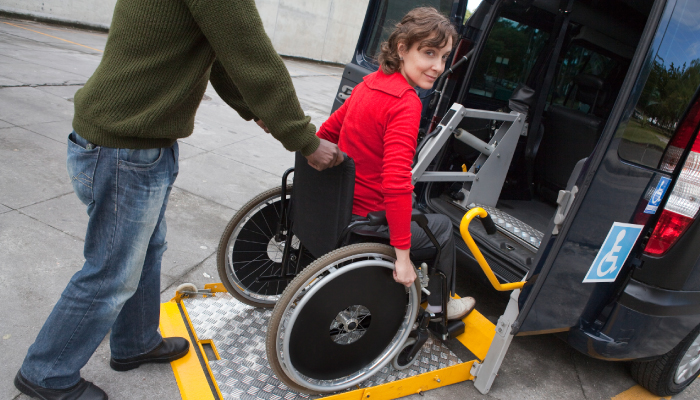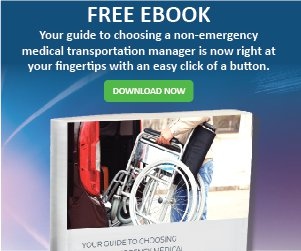 If you can’t get to your doctor’s appointment it doesn’t do much good to have a Medicaid benefit. Non-emergency Medical Transportation (NEMT) plays one of the biggest roles in regards to Medicaid Members’ access to health care. Medical transportation has been federally supported for almost 40 years. The benefit has withstood numerous lawsuits over a long period of time with each concluding that the Benefit is deemed essential to access. As part of the Deficit Reeducation Act, the ability for states to outsource this responsibility to professional brokers became a formal part of federal guidelines. LogistiCare is the leading broker of NEMT services and we partner with states and Managed Care Organizations (MCOs) in 39 states to aid in the assistance of arranging transportation deemed critical to the health and well-being of our members. Once LogistiCare is contracted by a State or Managed Care Organization, we are obligated by law to deliver the service, but more than that, we see it as our duty to our members and we strive to serve them with excellence in mind.
If you can’t get to your doctor’s appointment it doesn’t do much good to have a Medicaid benefit. Non-emergency Medical Transportation (NEMT) plays one of the biggest roles in regards to Medicaid Members’ access to health care. Medical transportation has been federally supported for almost 40 years. The benefit has withstood numerous lawsuits over a long period of time with each concluding that the Benefit is deemed essential to access. As part of the Deficit Reeducation Act, the ability for states to outsource this responsibility to professional brokers became a formal part of federal guidelines. LogistiCare is the leading broker of NEMT services and we partner with states and Managed Care Organizations (MCOs) in 39 states to aid in the assistance of arranging transportation deemed critical to the health and well-being of our members. Once LogistiCare is contracted by a State or Managed Care Organization, we are obligated by law to deliver the service, but more than that, we see it as our duty to our members and we strive to serve them with excellence in mind.
The History and Law Suits that Challenged It
Medicaid’s transportation assurance traces its history as far back as 1966 to provisions of the original Act contained within the Handbook of Public Assistance (Supplement D). In the Medicaid Medical Transportation Assurance 2009 Report issued by the Department of Health Policy, they note that although the original statute itself didn’t speak directly to transportation, numerous provisions formed the legal basis for subsequent policy following it, including:
- A state’s medical assistance plan must operate in all parts of a state
- All members must be treated comparably in terms of coverage and care
- Efficiency must be implemented in program administration
- The program must be administered in “the best interests” of program recipients
- “Prompt” medical assistance must be given
A plethora of consistent case law since 1974’s Smith v. Vowell upheld these Medicaid medical transportation assurance rights for members. And in 2006, explicit reference was made to states’ transportation obligations in amendments to The Deficit Reduction Act.
The Federal Mandates
The Deficit Reduction Act of 2006 amended the Medicaid statute to permit states to establish NEMT brokerage programs. Brokers like LogistiCare can manage the entire NEMT program for states from receiving the trip requests, to assigning and scheduling drivers via their own transportation networks, to providing fares on public transport such as buses or subways. However, their role is far greater. They ensure Medicaid rules are followed, manage waste and abuse mitigation, provide data analysis and reporting to support States and MCOs, and advocate for members.
In order for a State to establish a NEMT brokerage program for providing transportation as a medical assistance benefit versus an administrative services benefit which carries a much higher Federal Match (FMAP), a State must submit a State plan amendment (SPA) that elects this option and assures that applicable requirements related to cost effectiveness, competitive procurement, oversight and quality are being met according to a Department of Health and Human Services (DHHS) March 31, 2006 Letter.
Beyond these requirements, States have considerable discretion regarding what services they contract with brokers and how they oversee them. For example, States may choose to use brokers in only limited geographic locations, such as metropolitan areas, or they may use brokers to handle all aspects of NEMT services statewide.
How the Contracts Are Structured
Once the competitive procurement process is completed, a detailed contract results. NEMT brokers are typically paid in one of two ways: 1) A full risk model, where a lump sum per member is paid each month regardless of whether that member uses the service. The amount paid fluctuates each month according to enrollment. 2) An Administrative services model (ASO), where a set administration fee is paid on a per trip basis. In this model, the State or Managed Care Organization is responsible for paying the actual transportation costs associated with the delivery of services.
The rules don’t allow any broker to deny a ride at the end of any given month because a lump sum has allegedly been exhausted. Brokers must administer rides according to the contract rules precisely. While there are provisions incorporated into the contracts to protect brokers from sudden, major jumps in enrollment in a full-risk model, contract provisions also specifically outline the oversight, audits, and penalties designed to protect state or MCO members.
By law, members have access to the benefits of their health plan. Any missed trip must be reported. If the number of missed trips hits a certain percentage a damage payment often results. We care about getting our members access to the health care they need to stay healthy and participate in their communities longer. We also are obligated to run those rides in the least costly and most efficient way possible in order. LogistiCare is striking the balance by investing in our people and technology to create new paths towards excellence.
Lots of Value Created
Today, most states are implementing brokerage NEMT models because of the cost efficiency and protection that results. Take a look at these other articles that show what LogistiCare is doing in New Jersey and New York to create efficiency. Every day we look at new ways to improve our processes, spark new technological innovations, and create value, not just for our members but for tax payers.
Sources
- Federal Medical Assistance Percentage (FMAP). Non-Emergency Medical Transportation Services Summary. 2014.
- Medicaid’s Medical Transportation Assurance: Origins, Evolution, Current Trends, and Implications for Health Reform. Department of Health Policy. 2009.



